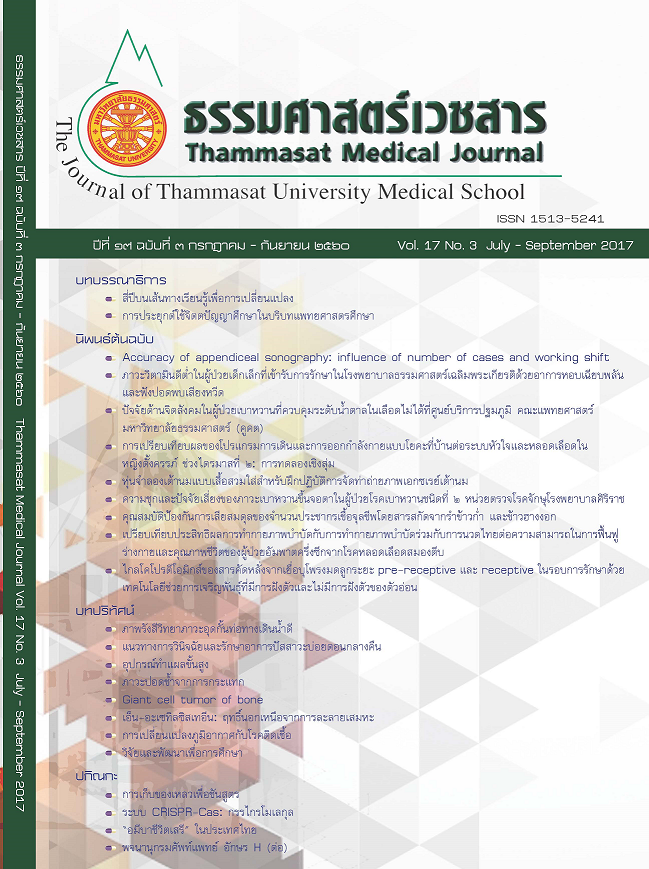Psychosocial factors relating to poorly controlled diabetic patients at primary medical center, faculty of medicine, Thammasat university (Kukot)
Keywords:
Psychosocial factor, DM patients, Poorly controlled DM, Primary care, ปัจจัยทางจิตสังคม, ผู้ป่วยเบาหวาน, เบาหวานคุมไม่ได้, ปฐมภูมิAbstract
Introduction: Even though a group of diabetic patients was treated with clinical practice guideline by medical professionals, it was perhaps poorly controlled. We found that they did not comply theirtreatments or lost to follow up. So we aimed to study psychosocial factors in poorly
controlled diabetic patients in primary medical center.
Method: Qualitative study were done in 10 poor adherence patients who had HbA1c > 10 at Kukot primary medical center. We applied in-depth interviews to our participants for several psychosocial aspects and used analytic induction to analyze information from emic views.
Result: Poor self-efficacy participants often had chronic stress, depression and low social supports. Moderate to good self-efficacy participants mostly had financial & occupational problems or high risk situations. However, causes of depression and chronic stress were from financial
problems, familial conflicts and low social supports. Finance & occupation may be a first priority in their life. Diabetic knowledges that derived from illness experience of family members always influence on attitudes and health behaviors of our participants.
Discussion and Conclusion: A psychosocial exploration, we should first consider perceiving self-efficacy of patient. If perceiving was poor, patients would not have willing to control their disease that affect their worse health behavior. High risk situations of this study were different from other studies. Situations were concerned with participant realization that their closed relative were important than themselves. Results were poor medication self-care, worse eating lifestyle, loss to follow up and difficulties in accessing healthcare. Participant who work overtime informed that they did not think of their health when they worked hard. Fatigue made them do not concentrate to taking medicines or picking up appropiate food. Suggestion is holistic individual diabetes mellitus approach by considering psychosocial aspects, respectively. Health care providers should discuss about illness experiences that can lead health behaviours of the patient.
บทนำ: ผู้ป่วยเบาหวานส่วนหนึ่งที่แม้ได้รับการรักษาตามแนวทางเวชปฏิบัติโดยแพทย์ผู้เชี่ยวชาญแล้วยังควบคุมน้ำตาลไม่ได้ พบว่าผู้ป่วยส่วนหนึ่ง ไม่ปฏิบัติตามข้อตกลงในการรักษาหรือไม่มาตรวจตามนัด งานวิจัยจึงทำขึ้นเพื่อศึกษาปัจจัยทางจิตสังคมในผู้ป่วยเบาหวานที่คุมระดับน้ำตาลไม่ได้
วิธีการศึกษา: เป็นการศึกษาโดยวิธีการวิจัยเชิงคุณภาพ เก็บข้อมูลแบบสัมภาษณ์เชิงลึก ในผู้ป่วยเบาหวานจากศูนย์ปฐมภูมิคูคตที่มีระดับระดับฮีโมโกลบินเอวันซีมากกว่า ๑๐ และมีความร่วมมือในการติดตามการรักษาไม่ดี (poor adherence patients) จำนวน ๑๐ ราย วิเคราะห์ข้อมูลเชิงเนื้อหาแบบอุปนัย (analytic induction) โดยวิเคราะห์
จากทรรศนะของคนใน (emic view) เก็บข้อมูลปัจจัยทางจิตสังคมในด้านต่างๆ
ผลการศึกษา: ผู้เข้าร่วมวิจัยที่การรับรู้สมรรถนะของตนเองไม่ดี (poor self-efficacy) มักพบความเครียด (chronic stress) ภาวะซึมเศร้า (depression) และได้รับแรงสนับสนุนจากครอบครัวและสังคมน้อย (low social support) ร่วมด้วยส่วนกลุ่มการรับรู้สมรรถนะของตนเองดี (moderate to good self-efficacy) มักพบว่ามีปัญหาด้านเศรษฐานะและการประกอบอาชีพ (finance and occupation) และสถานการณ์เสี่ยงต่อการควบคุมโรคไม่ได้ (high risk situation) ปัจจัยด้านภาวะซึมเศร้าและความเครียดมักมีสาเหตุจากปัญหาเศรษฐกิจและความห่างเหิน ของครอบครัวในสังคมกึ่งเมือง ทำให้มีแรงสนับสนุนจากครอบครัวและสังคมน้อย ผู้ร่วมวิจัยส่วนมากจัดให้ เศรษฐานะ และการประกอบอาชีพ เป็นความสำคัญอันดับแรก (first priority) ในชีวิตก่อนการดูแลสุขภาพ ความรู้เรื่อง สุขภาพ (diabetic knowledge) ที่ได้จากการเรียนรู้จากความเจ็บป่วยของคนใกล้ชิดมีอิทธิพลต่อทัศนคติและการปฏิบัติตัวต่อโรคของผู้ร่วมวิจัยเป็นอย่างมาก
วิจารณ์ และสรุปผลการศึกษา: การค้นหาปัจจัยทางจิตสังคมของคนไข้เบาหวานที่คุมน้ำตาลไม่ได้ อาจพิจารณาการรับรู้สมรรถนะของตนเองเป็นอันดับแรก เนื่องจากหากมีการรับรู้ว่าไม่ดีมักเชื่อมโยงกับการไม่อยากควบคุมโรคโดยตรงและทำให้ผู้ป่วยมีพฤติกรรมไม่ควบคุมโรคด้วย ประเด็นสถานการณ์เสี่ยงต่อการควบคุมโรคไม่ได้ พบว่าสถานการณ์เสี่ยงแตกต่างไปจากงานวิจัยในต่างประเทศ คือเป็นสถานการณ์ที่เกี่ยวข้องกับการให้ความสำคัญกับญาติพี่น้องมากกว่าตนเองและมีผลมากกว่าการเลือกรับประทานอาหารที่ไม่เหมาะสม และยังส่งผลต่อการดูแลตนเองด้านอื่นๆ จนขาดนัดขาดยา รวมถึงมีปัญหาการตัดสินใจเข้ารับการรักษาในสถานพยาบาล กลุ่มผู้เข้าร่วมวิจัยที่ต้องทำงานนอกเหนือช่วงเวลากลางวันให้ข้อมูลว่า ในช่วงที่ทำงานหนักจะไม่ได้คิดถึงสุขภาพตนเอง บางครั้งเหนื่อย โหย จึงไม่ได้จดจ่อกับการควบคุมอาหาร ลืมกินยาตรงเวลา แนะนำให้มีการดูแลแบบเป็นคำนึงถึงปัจจัยจิตสังคมและบริบทเป็นรายบุคคล โดยพูดคุยการเชื่อมโยงประสบการณ์เจ็บป่วยที่ผู้ป่วยเคยพบเจอซึ่งส่งผลต่อแนวการปฏิบัติตัวต่อโรคในผู้ป่วยกลุ่มนี้


